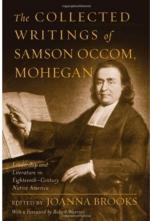|
This section contains 2,415 words (approx. 9 pages at 300 words per page) |

|
SOURCE: “Christian Indians: Samson Occom and William Apes,” in Forked Tongues: Speech, Writing and Representation in North American Indian Texts, Pinter Publishers, 1991, pp. 49-64.
In the following excerpt, Murray argues that the deferential tone in Occom's letters addressed to whites is a rhetorical tactic that allows him to mount criticisms of the whites.
The difficulties of talking about self-expression and power can be seen particularly clearly in the intermingling, in the early writings of Indians, of their perceptions of their own inferiority and the injustices done to them. The interconnection of these two issues was a historically determined matter, given the unequal relation of whites and Indians. Indians were inadequate and inferior to whites, if left in their natural state. If, therefore, they suffered under the march of progress it was not anyone's fault, least of all the whites'. On the other hand, once they had had the...
|
This section contains 2,415 words (approx. 9 pages at 300 words per page) |

|


